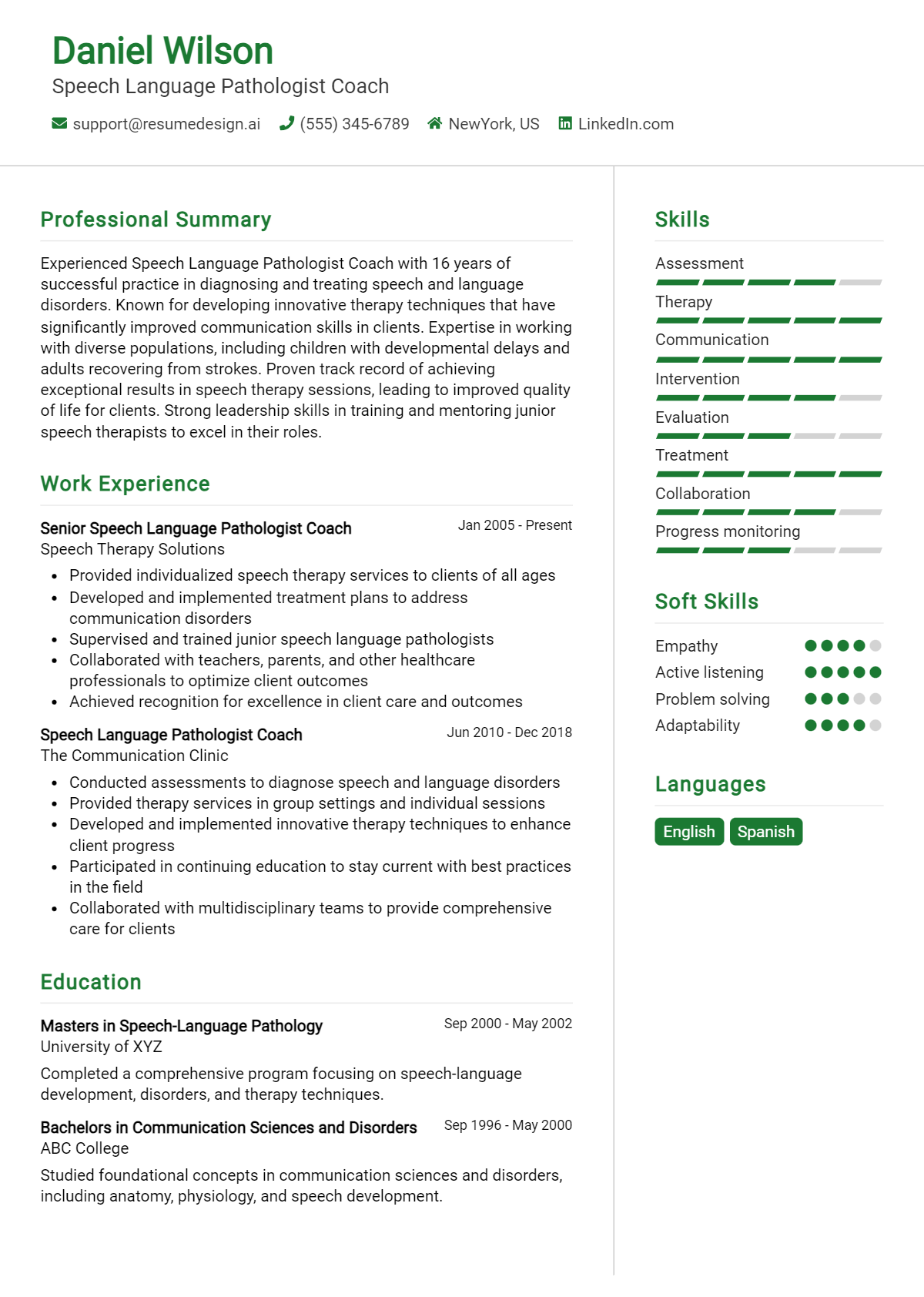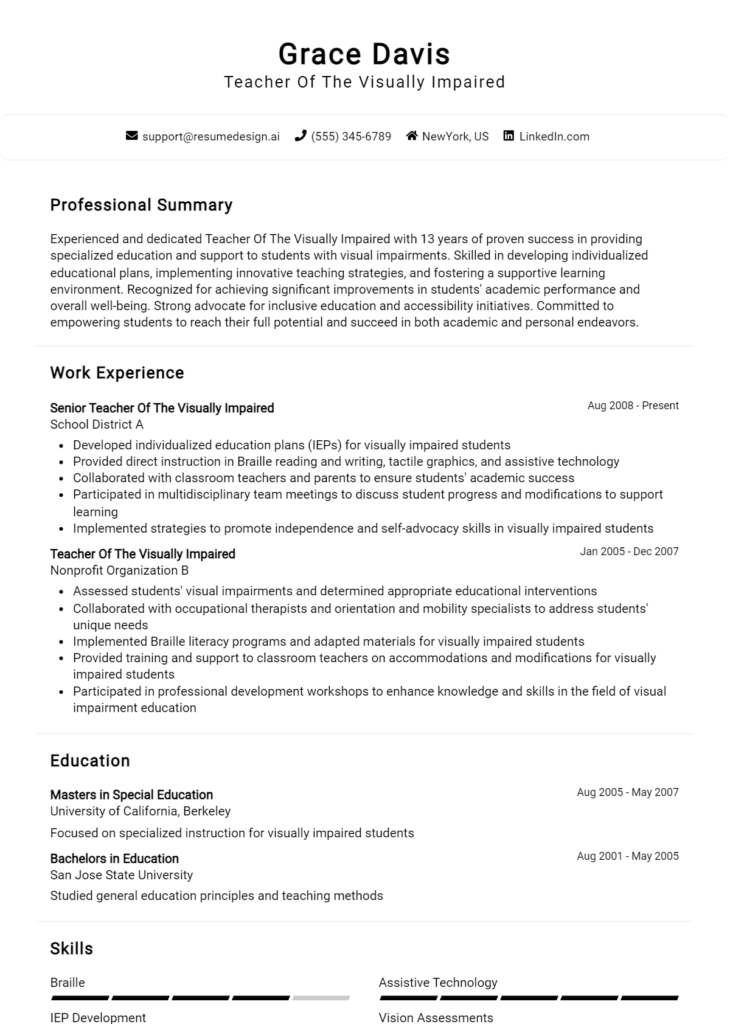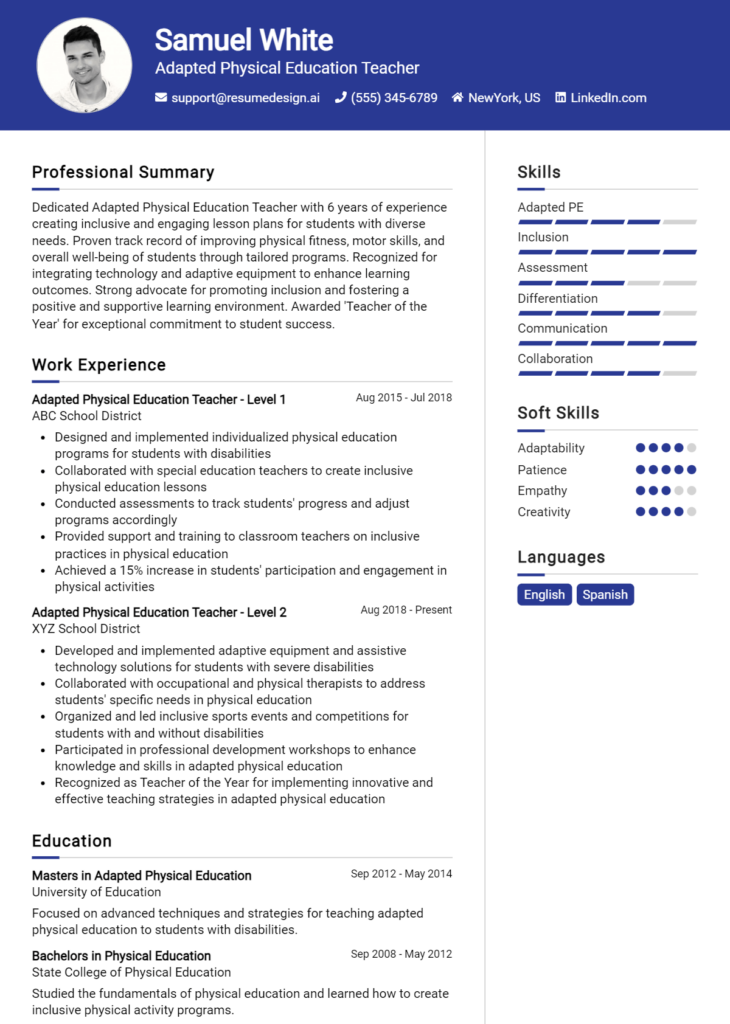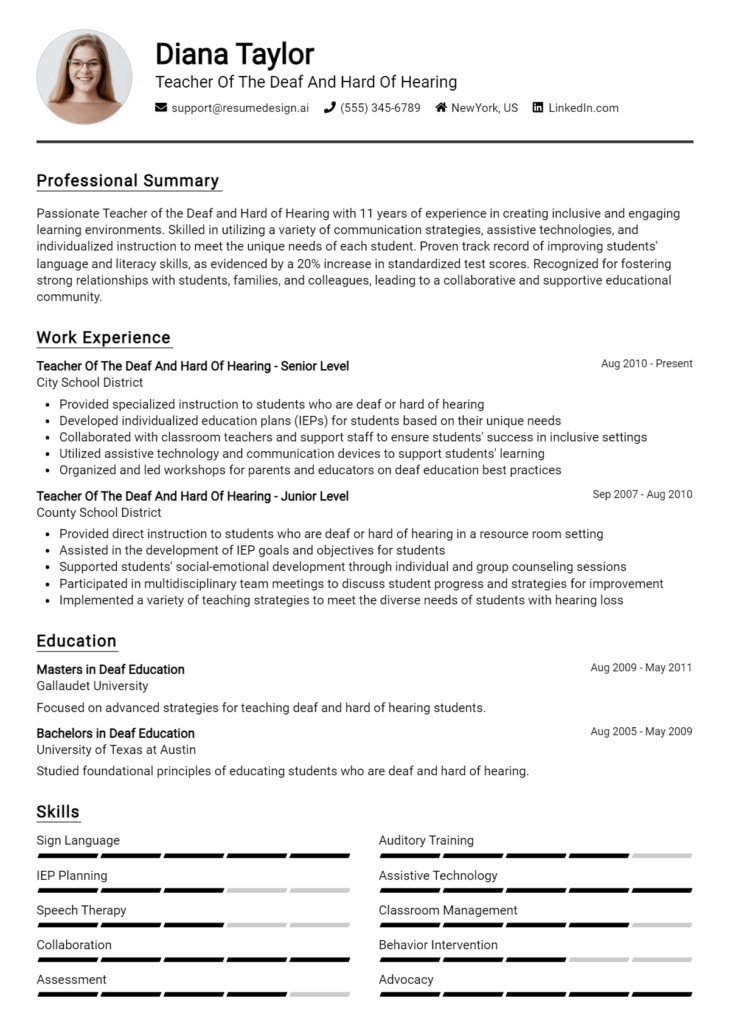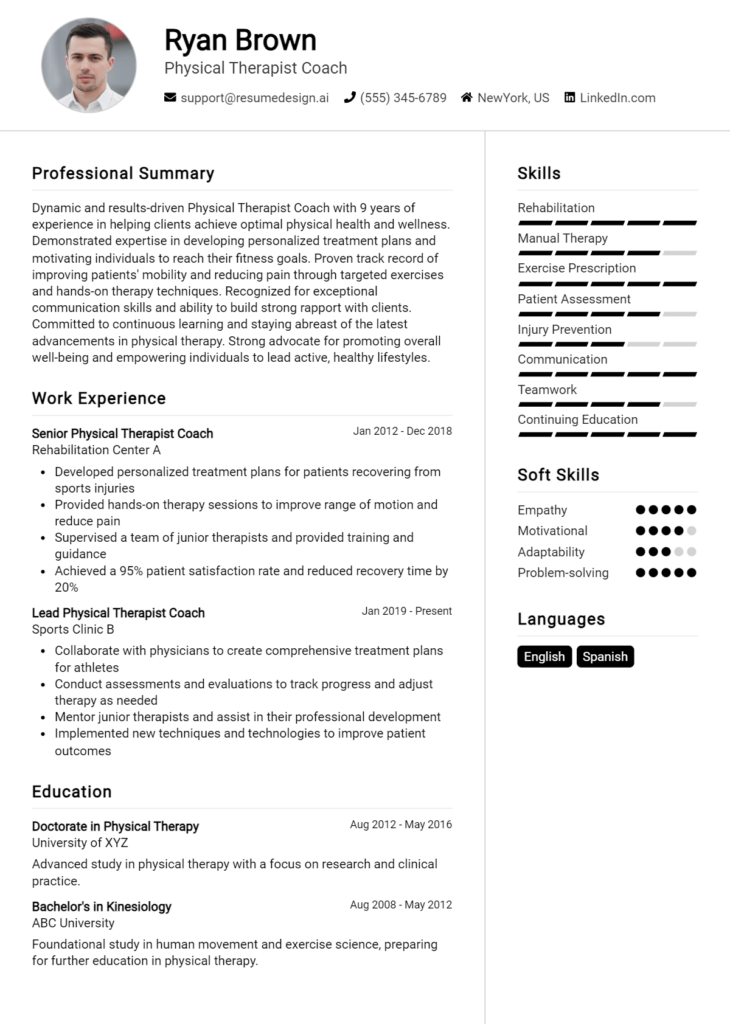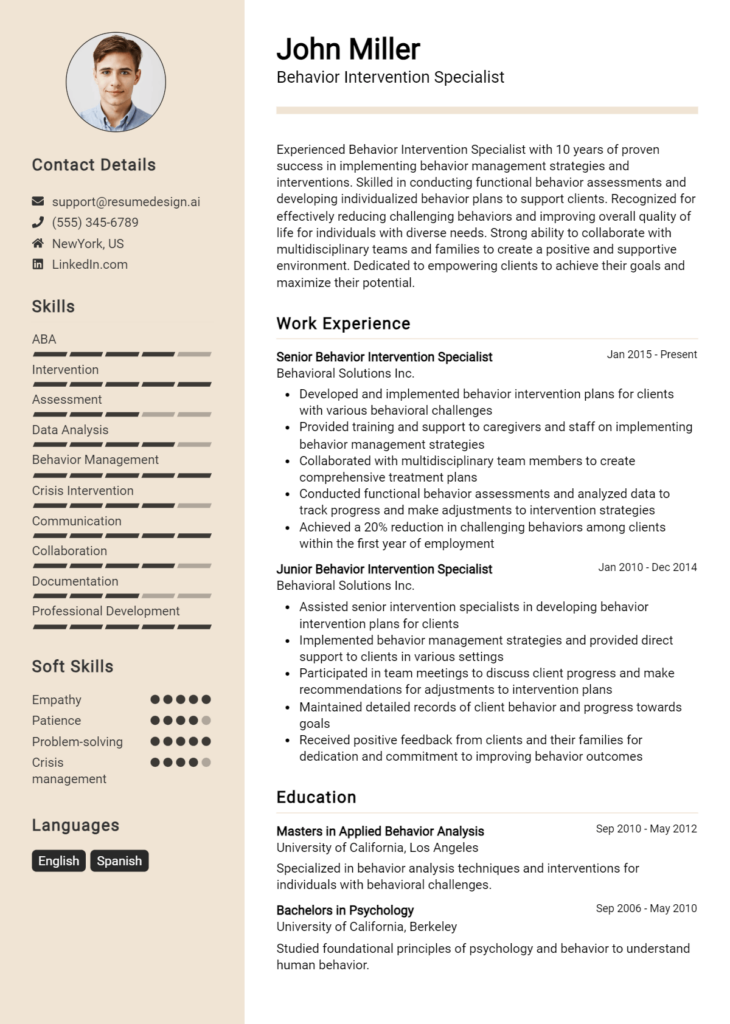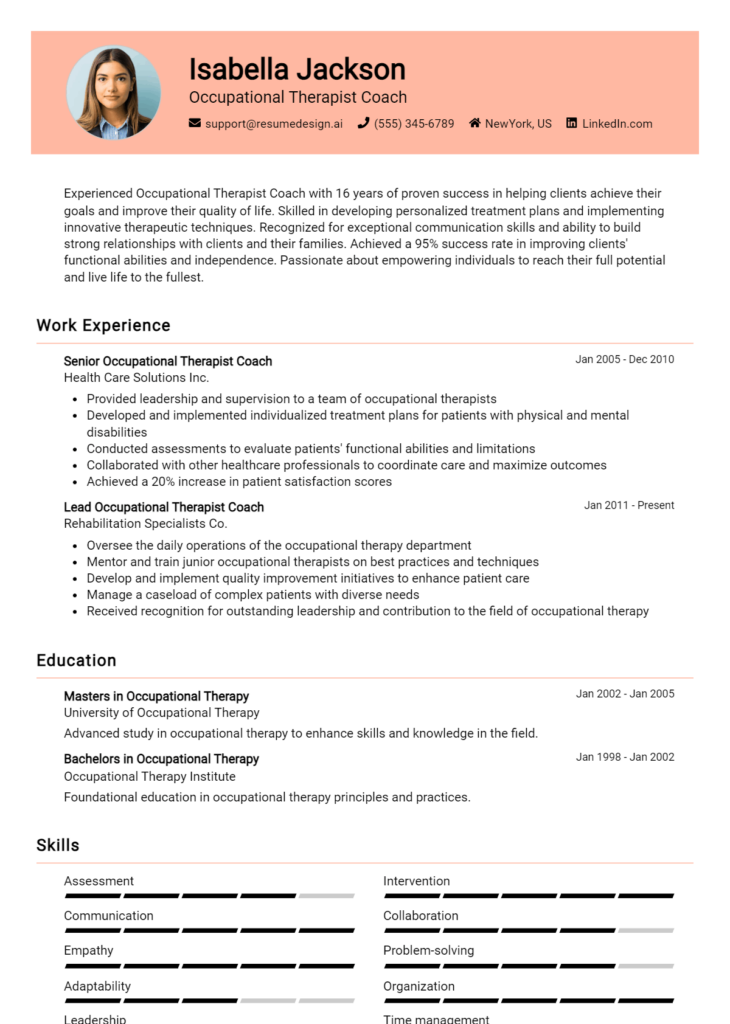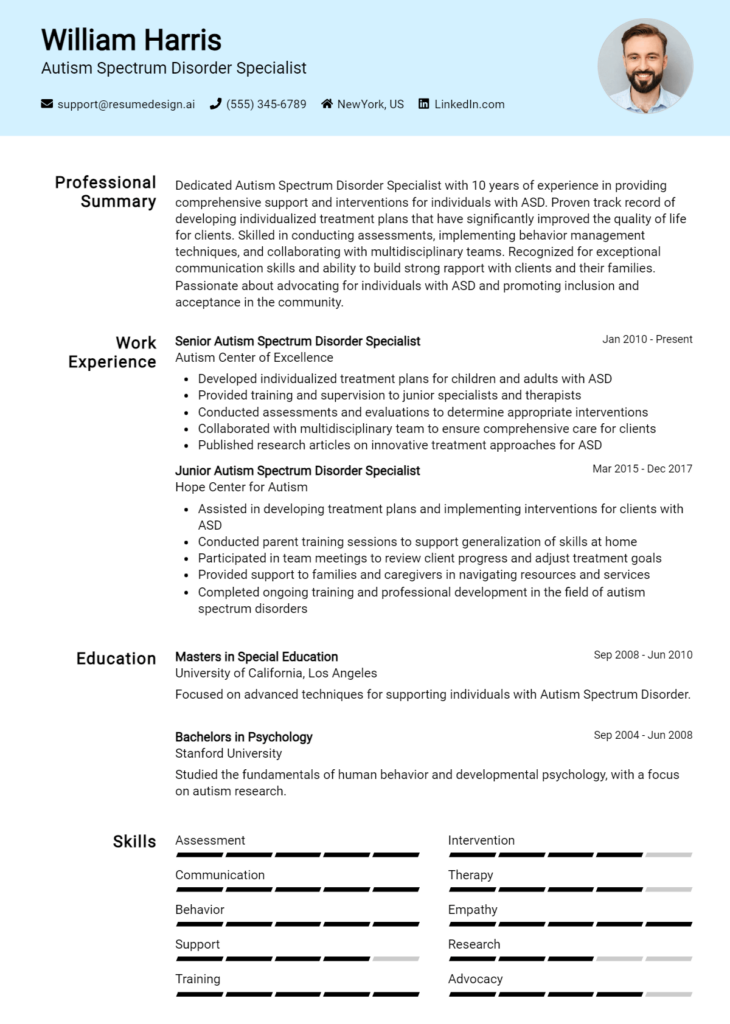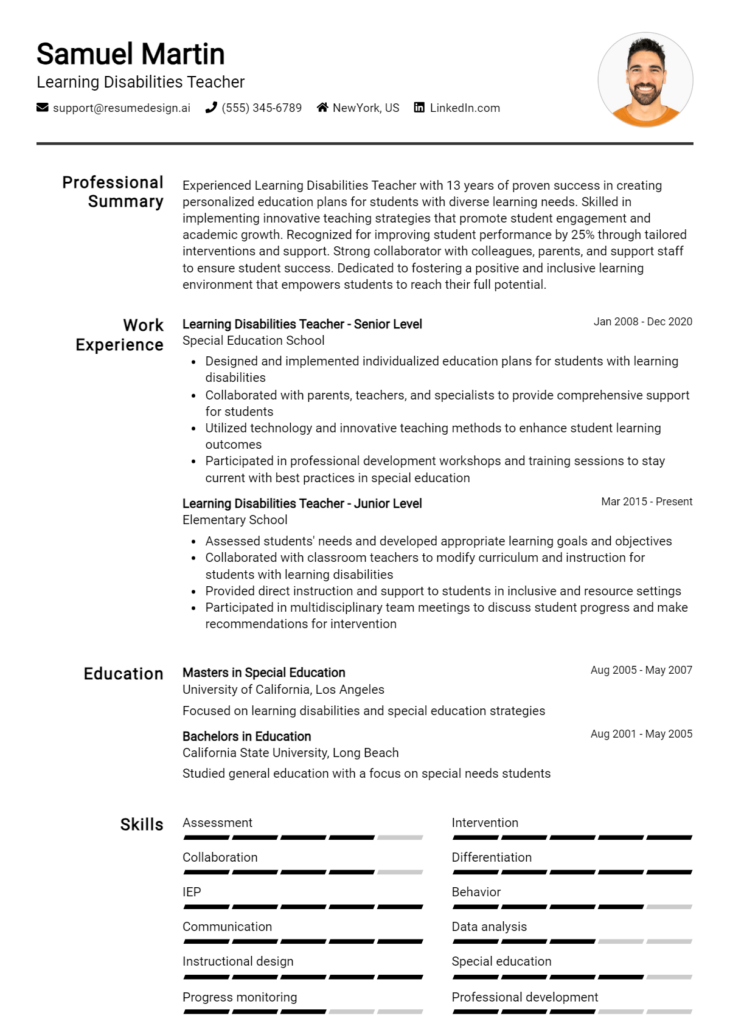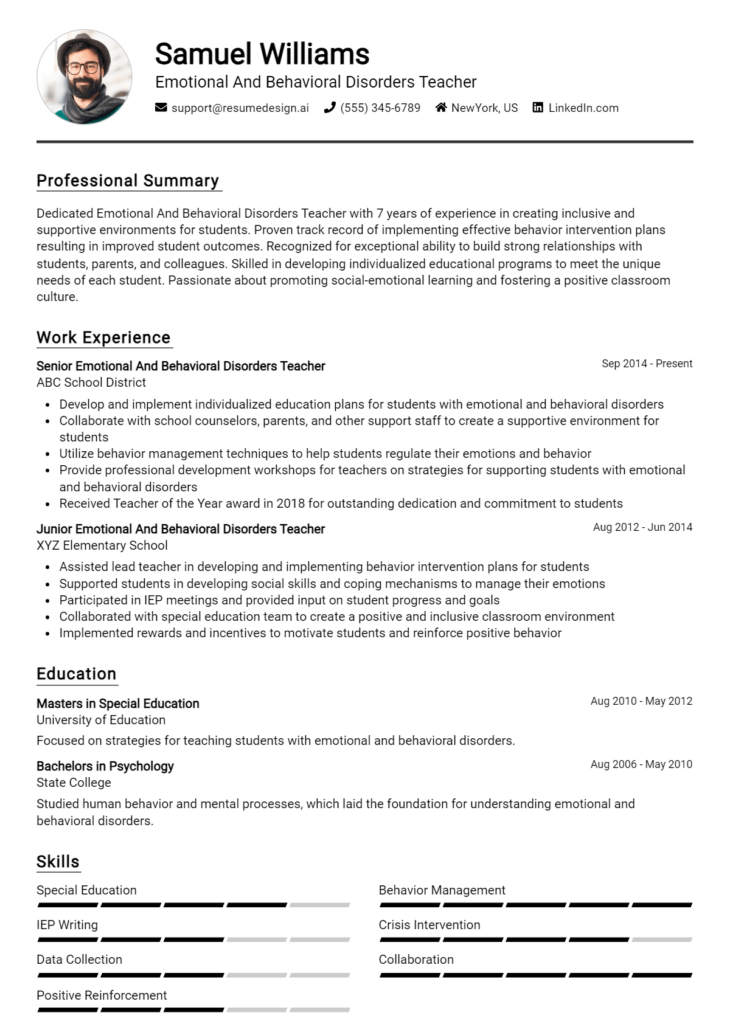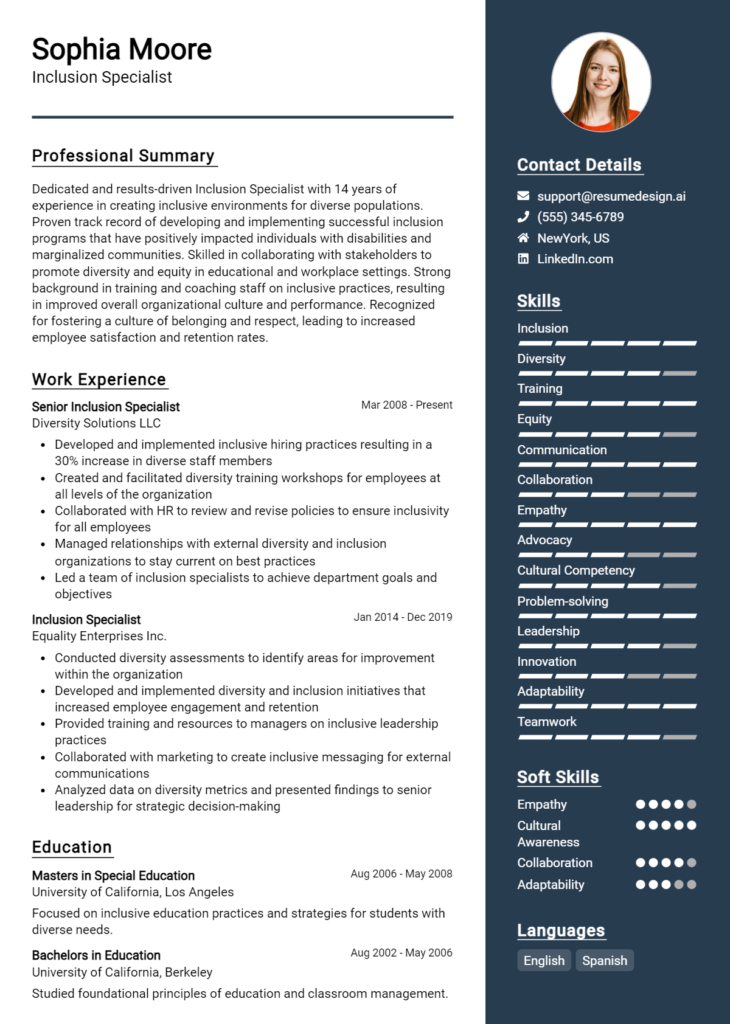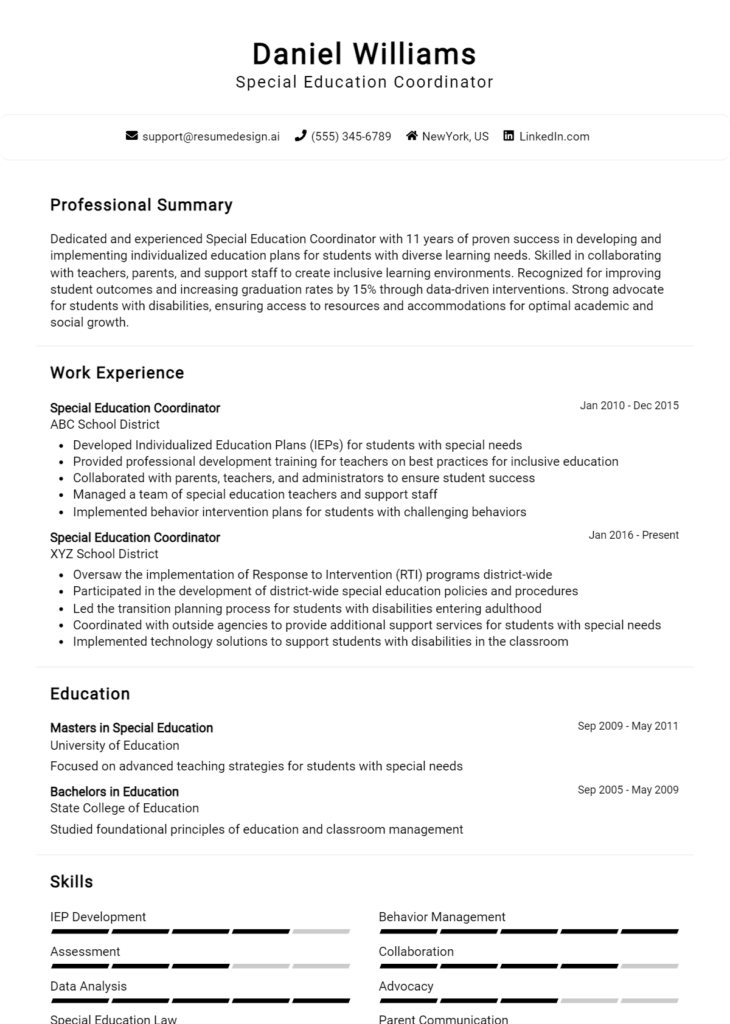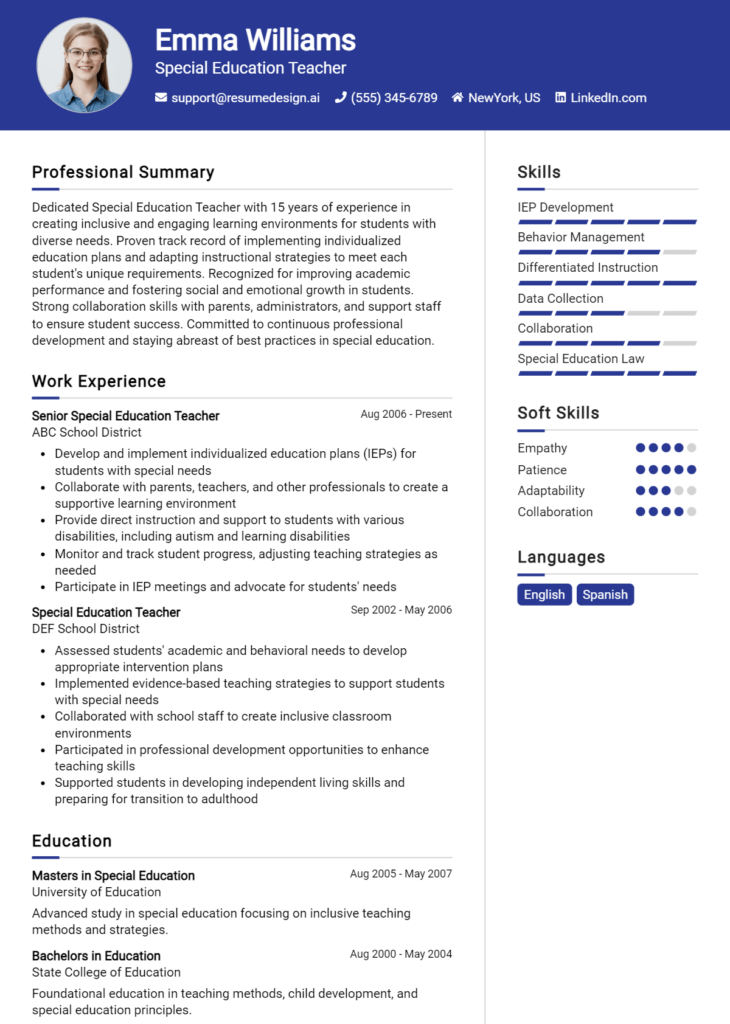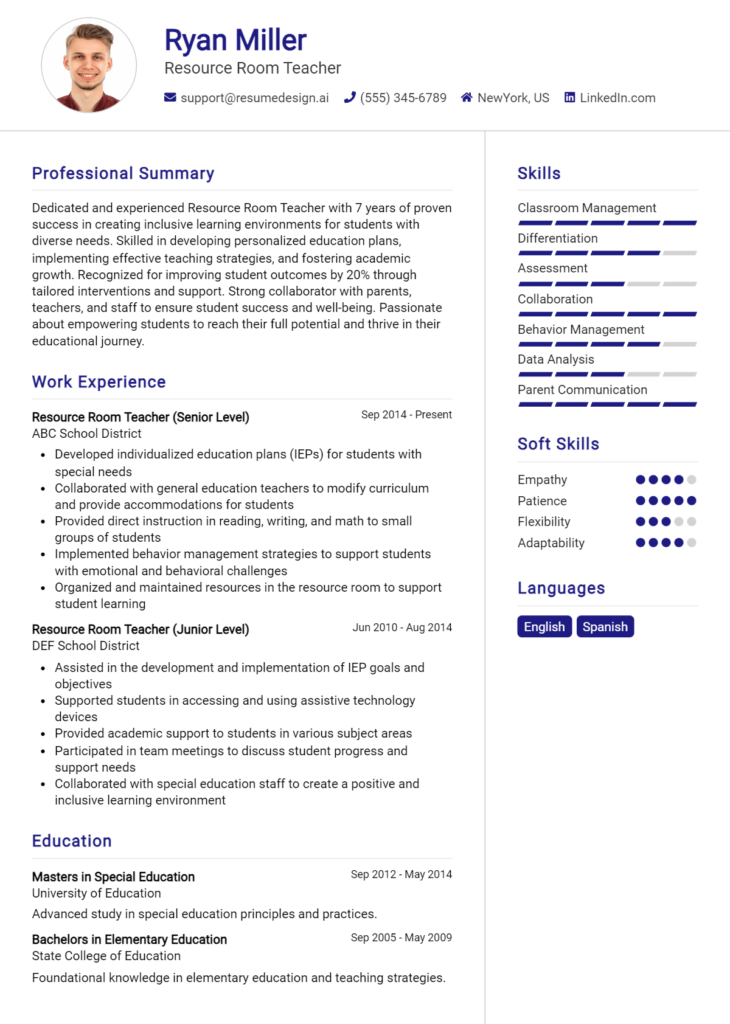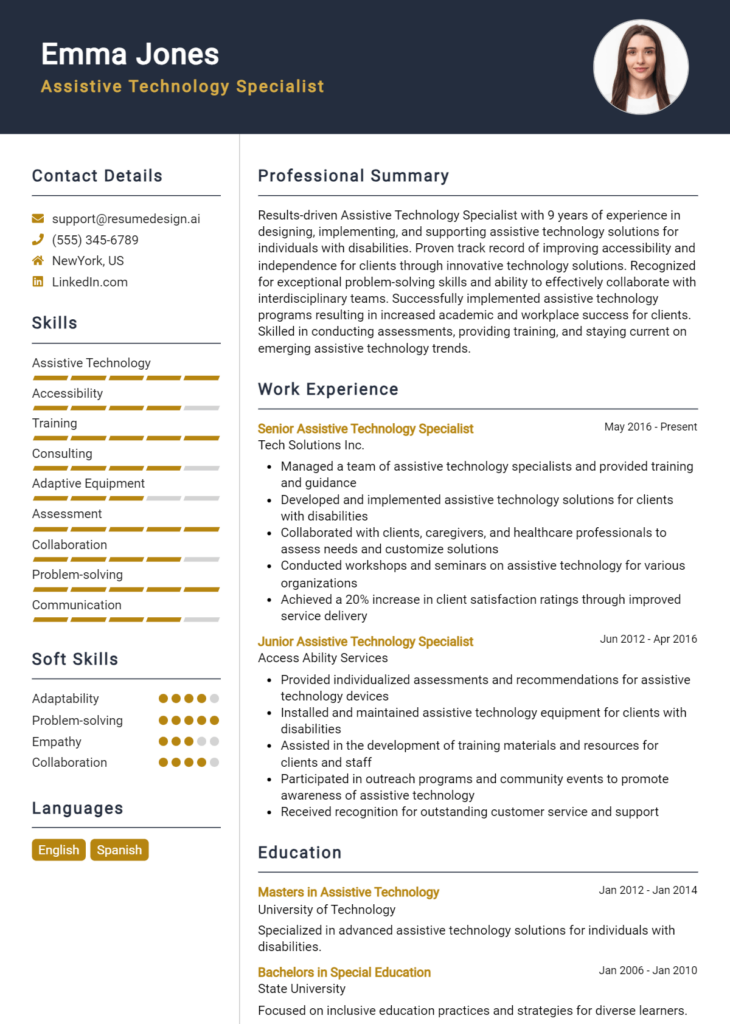Speech-Language Pathologist Coach Core Responsibilities
A Speech-Language Pathologist Coach plays a critical role in enhancing the proficiency of speech-language pathologists by providing guidance, training, and support across various departments. Key responsibilities include developing training programs, conducting assessments, and collaborating with clinicians and educators to ensure effective intervention strategies. Essential skills encompass technical expertise in communication disorders, operational management, and problem-solving abilities, which collectively contribute to the organization's overarching goals. A well-structured resume can effectively highlight these qualifications, showcasing the candidate's ability to bridge multiple functions within the organization.
Common Responsibilities Listed on Speech-Language Pathologist Coach Resume
- Design and implement training programs for speech-language pathologists.
- Conduct assessments and evaluations of speech and language services.
- Collaborate with multidisciplinary teams to enhance service delivery.
- Monitor and analyze outcomes to improve therapy effectiveness.
- Provide mentorship and support to new and existing staff.
- Develop and update instructional materials and resources.
- Facilitate workshops and professional development sessions.
- Advocate for best practices in speech-language pathology.
- Assist in program development and policy implementation.
- Evaluate and provide feedback on clinical practices.
- Maintain documentation and compliance with regulatory standards.
- Engage in continuous professional development and research.
High-Level Resume Tips for Speech-Language Pathologist Coach Professionals
In the competitive field of speech-language pathology, a well-crafted resume is essential for professionals aspiring to become Speech-Language Pathologist Coaches. Often serving as the first point of contact between candidates and potential employers, your resume must effectively showcase not only your qualifications but also your unique skills and achievements. This document is your opportunity to make a lasting impression and stand out in a pool of applicants. This guide will provide practical and actionable resume tips specifically tailored for Speech-Language Pathologist Coach professionals, helping you present your best self to prospective employers.
Top Resume Tips for Speech-Language Pathologist Coach Professionals
- Tailor your resume for each job application by aligning your skills and experiences with the job description.
- Highlight your relevant coaching experience, including any specific methodologies and techniques you have employed.
- Quantify your achievements with metrics, such as improved patient outcomes or the number of clients successfully coached.
- Include industry-specific keywords to ensure your resume passes through Applicant Tracking Systems (ATS).
- Showcase your educational background, certifications, and any specialized training relevant to coaching in speech-language pathology.
- Provide examples of collaborative work with other healthcare professionals to demonstrate your teamwork skills.
- Use a clean and professional format to enhance readability, ensuring that key information stands out.
- Incorporate a strong summary statement at the top of your resume that encapsulates your coaching philosophy and professional goals.
- Keep your resume concise, ideally one page, focusing on the most relevant experience and skills.
By implementing these tips, you can significantly enhance your resume and increase your chances of landing a job in the Speech-Language Pathologist Coach field. A polished and targeted resume will not only reflect your qualifications but also demonstrate your commitment to excellence in coaching, making a compelling case for your candidacy.
Why Resume Headlines & Titles are Important for Speech-Language Pathologist Coach
In the competitive field of speech-language pathology, a well-crafted resume headline or title is essential for a Speech-Language Pathologist Coach. This brief but powerful phrase serves as the first impression for hiring managers, effectively summarizing a candidate's key qualifications and expertise in an instant. A strong headline can immediately grab attention, setting the stage for the rest of the resume. It should be concise, relevant, and directly related to the specific job being applied for, ensuring that it resonates with the needs of the employer while highlighting the unique strengths of the candidate.
Best Practices for Crafting Resume Headlines for Speech-Language Pathologist Coach
- Keep it concise—aim for one to two impactful sentences.
- Use role-specific language that aligns with the job description.
- Highlight your most relevant skills or accomplishments.
- Incorporate keywords that are likely to catch the hiring manager's attention.
- Avoid jargon and keep the language accessible.
- Focus on what sets you apart from other candidates.
- Make it action-oriented by using strong verbs where applicable.
- Ensure it aligns with your overall career narrative and goals.
Example Resume Headlines for Speech-Language Pathologist Coach
Strong Resume Headlines
Dedicated Speech-Language Pathologist Coach with 10+ Years of Experience in Pediatric Therapy
Innovative Speech-Language Pathologist Coach Specializing in Evidence-Based Practices and Collaborative Care
Certified Speech-Language Pathologist with Proven Success in Developing Tailored Communication Programs
Results-Driven Speech-Language Pathologist Coach Committed to Enhancing Patient Outcomes Through Strategic Interventions
Weak Resume Headlines
Speech-Language Pathologist Looking for a Job
Experienced Coach in Speech and Language
Strong headlines are effective because they immediately communicate the candidate's expertise, experience, and unique qualifications in a clear and compelling manner. They use specific language that resonates with hiring managers and incorporate elements that showcase the candidate's value. In contrast, weak headlines fail to impress due to their vagueness and lack of specificity. They do not convey the candidate's strengths or align with the job requirements, making them forgettable and less likely to attract attention in a crowded field.
Writing an Exceptional Speech-Language Pathologist Coach Resume Summary
A well-crafted resume summary is vital for a Speech-Language Pathologist Coach, as it serves as the first impression a hiring manager has of a candidate. This brief yet powerful section should encapsulate the candidate's key skills, relevant experience, and notable accomplishments that directly relate to the role. An impactful summary not only grabs attention but also sets the tone for the entire resume, making it essential for candidates to be concise, specific, and tailored to the job they are applying for. A strong summary can differentiate a candidate from others, showcasing their unique qualifications in the competitive field of speech-language pathology coaching.
Best Practices for Writing a Speech-Language Pathologist Coach Resume Summary
- Quantify Achievements: Use numbers and metrics to highlight your successes, such as improvements in client outcomes or program efficiency.
- Focus on Key Skills: Emphasize skills that are essential for the role, such as assessment, intervention strategies, and coaching techniques.
- Tailor to the Job Description: Align your summary with the specific requirements and qualifications mentioned in the job posting.
- Use Action-Oriented Language: Start sentences with strong action verbs to convey confidence and proactivity.
- Highlight Relevant Experience: Mention years of experience and any specialized training or certifications that enhance your expertise.
- Keep it Concise: Aim for 2-4 sentences that effectively communicate your qualifications without being overly detailed.
- Showcase Professional Development: Include any continuing education or workshops that reinforce your commitment to the field.
- Reflect Your Passion: Convey enthusiasm for the role and the impact you aim to have on clients and the organization.
Example Speech-Language Pathologist Coach Resume Summaries
Strong Resume Summaries
Dynamic Speech-Language Pathologist Coach with over 8 years of experience enhancing communication skills in children and adults. Achieved a 30% improvement in client speech outcomes through tailored intervention strategies and ongoing support. Passionate about empowering clients and training fellow professionals in evidence-based practices.
Results-driven Speech-Language Pathologist with a proven track record of developing successful therapy programs. Trained over 50 staff members in innovative coaching techniques, resulting in a 25% increase in client satisfaction ratings. Committed to fostering collaborative environments that enhance learning and communication.
Dedicated Speech-Language Pathologist Coach with 10 years of clinical experience and expertise in neurogenic communication disorders. Spearheaded a community outreach program that increased service accessibility by 40%, significantly improving client engagement and outcomes. Adept at utilizing technology to support therapy and coaching strategies.
Weak Resume Summaries
Experienced Speech-Language Pathologist with various skills and knowledge in the field. I have worked with many clients and have done some coaching.
Speech-Language Coach with background in therapy. I am passionate about helping people communicate better.
The examples provided illustrate the differences between strong and weak resume summaries effectively. Strong summaries are specific, quantifiable, and directly aligned with the role of a Speech-Language Pathologist Coach, showcasing measurable outcomes and relevant skills. In contrast, weak summaries lack detail, fail to highlight achievements or relevant experience, and come across as generic, making it challenging for hiring managers to assess the candidate's true qualifications.
Work Experience Section for Speech-Language Pathologist Coach Resume
The work experience section of a Speech-Language Pathologist Coach resume is essential in demonstrating the candidate's technical skills, leadership capabilities, and commitment to delivering high-quality therapeutic services. This section serves as a platform to showcase not only the candidate's hands-on experience in speech-language pathology but also their ability to manage teams effectively and achieve measurable outcomes. By quantifying achievements and aligning experiences with industry standards, candidates can provide compelling evidence of their expertise and impact in the field, making a strong case for their candidacy.
Best Practices for Speech-Language Pathologist Coach Work Experience
- Clearly outline specific roles and responsibilities related to speech-language pathology coaching.
- Quantify achievements with metrics, such as improved client outcomes or team performance statistics.
- Highlight relevant certifications and technical skills that enhance coaching effectiveness.
- Demonstrate collaboration with multi-disciplinary teams and stakeholders.
- Include examples of innovative strategies or programs developed to enhance client care.
- Tailor experiences to align with the job description and industry standards.
- Use action verbs to convey initiative and leadership in past roles.
- Showcase ongoing professional development and continuing education in the field.
Example Work Experiences for Speech-Language Pathologist Coach
Strong Experiences
- Led a team of 10 speech-language pathologists, resulting in a 20% increase in client satisfaction scores over 12 months.
- Implemented a new therapy program that improved language development in children by an average of 30% within six months.
- Collaborated with school districts to design and deliver training workshops for educators, enhancing their ability to support students with communication disorders.
- Developed and executed a comprehensive evaluation process that streamlined service delivery, reducing wait times for assessments by 40%.
Weak Experiences
- Worked with clients on speech issues.
- Assisted in team meetings and discussions.
- Participated in various training sessions related to speech therapy.
- Helped in the development of therapy programs.
The examples categorized as strong experiences highlight specific, quantifiable outcomes and demonstrate technical leadership and successful collaboration. Each bullet point provides clear evidence of the candidate's contributions and positive impact in their roles. In contrast, the weak experiences lack specificity and measurable results, making them less compelling to potential employers. By focusing on concrete achievements and responsibilities, candidates can more effectively convey their value in the field of speech-language pathology coaching.
Education and Certifications Section for Speech-Language Pathologist Coach Resume
The education and certifications section of a Speech-Language Pathologist Coach resume is crucial as it effectively showcases the candidate's academic background and professional qualifications. This section not only highlights the essential degrees and licenses required for the role but also emphasizes industry-relevant certifications and continuous learning efforts. By providing detailed information about relevant coursework, specialized training, and recognized certifications, candidates can significantly enhance their credibility and demonstrate their alignment with the demands of the position, making a compelling case for their expertise in the field.
Best Practices for Speech-Language Pathologist Coach Education and Certifications
- List degrees and certifications in reverse chronological order to highlight the most recent achievements first.
- Include only relevant coursework that directly pertains to speech-language pathology or coaching methodologies.
- Highlight advanced or industry-recognized credentials, such as ASHA certification or specialized training in specific therapeutic techniques.
- Use clear and concise language to describe each qualification, ensuring readability and professionalism.
- Incorporate continuing education credits to showcase ongoing professional development.
- Be specific about the nature of training programs or workshops attended, including their relevance to the coaching role.
- Tailor the education and certifications section to match the job description and requirements of the position being applied for.
- Maintain consistency in formatting, using the same style for all entries to enhance the overall presentation of the resume.
Example Education and Certifications for Speech-Language Pathologist Coach
Strong Examples
- Master of Science in Speech-Language Pathology, University of XYZ, 2021
- Certificate of Clinical Competence in Speech-Language Pathology (CCC-SLP), ASHA, 2022
- Advanced Training in Cognitive-Communication Therapy, ABC Institute, 2023
- Continuing Education in Evidence-Based Practices for Speech-Language Pathology, 2023
Weak Examples
- Bachelor of Arts in Communication Studies, University of ABC, 2005
- Certification in Basic First Aid, Red Cross, 2019
- Non-specific online courses in general education topics, 2020
- Outdated certification in Speech Therapy Fundamentals, 2010
The examples listed above are considered strong because they directly relate to the qualifications and skills necessary for a Speech-Language Pathologist Coach. They showcase relevant degrees, certifications, and specialized training that enhance the candidate's credibility and expertise. In contrast, the weak examples highlight qualifications that are either outdated, irrelevant, or not aligned with the specific requirements of the role, which could detract from the candidate's appeal to potential employers.
Top Skills & Keywords for Speech-Language Pathologist Coach Resume
As a Speech-Language Pathologist Coach, showcasing a well-rounded set of skills on your resume is crucial for standing out in this competitive field. The role requires both clinical expertise and the ability to mentor and guide other practitioners. By highlighting your skills effectively, you not only demonstrate your qualifications but also your commitment to improving patient outcomes and supporting your colleagues' professional growth. Your resume should reflect a balance of soft skills, which facilitate communication and interpersonal relationships, and hard skills, which showcase your technical knowledge and clinical abilities.
Top Hard & Soft Skills for Speech-Language Pathologist Coach
Soft Skills
- Empathy
- Communication
- Active Listening
- Leadership
- Problem Solving
- Collaboration
- Adaptability
- Conflict Resolution
- Motivation
- Time Management
Hard Skills
- Speech and Language Assessment
- Treatment Planning
- Evidence-Based Practice
- Augmentative and Alternative Communication (AAC)
- Cognitive-Communication Disorders
- Articulation and Phonological Disorders
- Fluency Disorders
- Swallowing Disorders (Dysphagia)
- Pediatric and Adult Therapy Techniques
- Knowledge of Regulatory Standards and Compliance
For more insights on how to effectively present your skills and work experience in your resume, consider exploring additional resources tailored for optimizing your job application.
Stand Out with a Winning Speech-Language Pathologist Coach Cover Letter
I am writing to express my interest in the Speech-Language Pathologist Coach position at your esteemed institution. With a comprehensive background in speech-language pathology and a passion for mentoring emerging professionals in the field, I am excited about the opportunity to contribute to your team. My experience working with diverse populations has equipped me with the skills necessary to foster growth and development in both clients and fellow clinicians, ensuring effective communication strategies are implemented across various settings.
In my previous role as a Speech-Language Pathologist, I successfully implemented evidence-based practices and tailored interventions to meet the unique needs of each client. By utilizing a collaborative approach, I empowered my clients to achieve their communication goals while also coaching junior staff on best practices and innovative techniques. My commitment to ongoing professional development has led me to pursue advanced training opportunities, allowing me to remain at the forefront of the field and share this knowledge with others.
As a coach, I believe in the importance of creating a supportive and nurturing environment where clinicians can thrive. I strive to inspire confidence and independence in my mentees by providing constructive feedback and facilitating hands-on learning experiences. My approach is rooted in positive reinforcement, which has proven effective in motivating team members and enhancing their clinical skills. I am eager to bring this collaborative spirit to your organization and contribute to the professional growth of the speech-language pathology team.
I am excited about the possibility of joining your organization and contributing to the development of future speech-language pathologists. I am confident that my expertise and dedication to excellence in communication will make a positive impact on your team and the clients we serve. Thank you for considering my application; I look forward to the opportunity to discuss how my skills and experiences align with the goals of your organization.
Common Mistakes to Avoid in a Speech-Language Pathologist Coach Resume
When crafting a resume for a Speech-Language Pathologist Coach position, it's crucial to present your qualifications and experience effectively. Many candidates make common mistakes that can undermine their chances of standing out to potential employers. By avoiding these pitfalls, you can create a more polished and compelling resume. Here are some frequent errors to look out for:
Generic Objective Statements: Using a one-size-fits-all objective can make your resume blend in with others. Tailor your objective to reflect your passion for coaching and specific expertise in speech-language pathology.
Lack of Specificity: Failing to include specific accomplishments or metrics can make your experience seem vague. Instead of saying "improved client outcomes," quantify your achievements, such as "increased client speech intelligibility by 30%."
Ignoring Keywords: Many employers use applicant tracking systems (ATS) to filter resumes. Not incorporating relevant keywords from the job description may result in your resume being overlooked.
Overloading with Irrelevant Information: Including unrelated work experiences or excessive personal details can distract from your qualifications. Focus on experiences that highlight your coaching and speech-language pathology skills.
Neglecting Continuing Education: Speech-language pathology is an evolving field. Failing to mention ongoing education or certifications can signal a lack of commitment to professional development.
Poor Formatting: A cluttered or unprofessional layout can make your resume hard to read. Use clear headings, bullet points, and consistent fonts to enhance readability.
Typos and Grammatical Errors: Mistakes in spelling or grammar can create a negative impression. Always proofread your resume or have someone else review it for clarity and accuracy.
Not Highlighting Coaching Experience: As a Speech-Language Pathologist Coach, it's essential to emphasize your coaching abilities. Neglecting to showcase your mentorship or training experiences can diminish your candidacy.
Conclusion
As a Speech-Language Pathologist Coach, you've honed your skills in assessing and helping individuals overcome communication challenges. Your expertise in therapy techniques, patient management, and collaboration with educational and healthcare teams is invaluable. This role requires not only a deep understanding of speech and language development but also the ability to inspire and educate others in the field.
In this article, we've explored the key responsibilities of a Speech-Language Pathologist Coach, including mentoring other professionals, developing treatment plans, and participating in research to improve practices. We’ve also discussed the importance of effective communication with clients and stakeholders, as well as staying current with industry trends and advancements.
In conclusion, as you reflect on your career and the impact you make, it’s essential to ensure that your resume effectively showcases your qualifications and experiences. Take a moment to review your Speech-Language Pathologist Coach Resume and consider how you can highlight your unique strengths and accomplishments.
To assist you in this process, take advantage of the various resources available, such as resume templates, which can provide a strong foundation for your document. You might also find the resume builder helpful for creating a polished and professional layout. Additionally, explore resume examples tailored to your field for inspiration. Don’t forget to craft a compelling cover letter using our cover letter templates to complement your resume.
Now is the perfect time to refine your professional presentation and ensure you stand out in this vital field.

